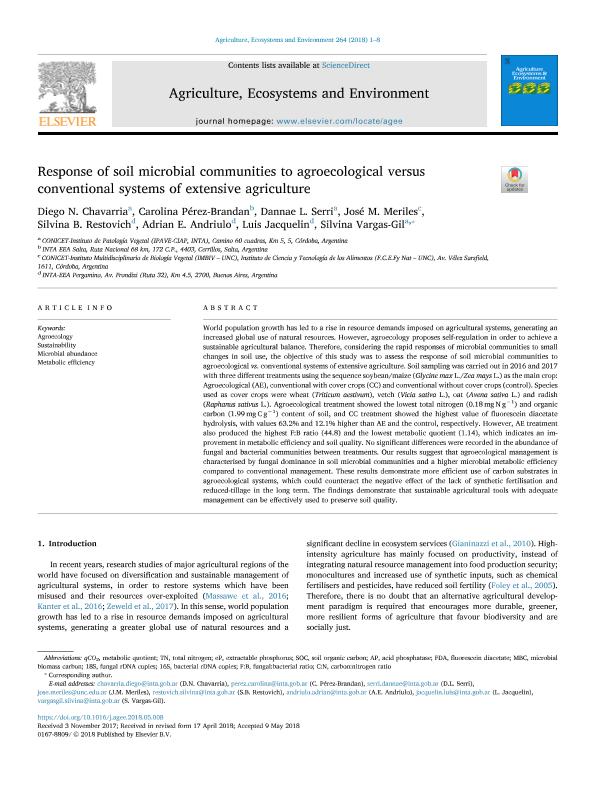Artículo
Response of soil microbial communities to agroecological versus conventional systems of extensive agriculture
Chavarría, Diego Nicolás ; Perez Brandan, Carolina Gabriela; Serri, Dannae; Meriles, Jose Manuel
; Perez Brandan, Carolina Gabriela; Serri, Dannae; Meriles, Jose Manuel ; Restovich, Silvina Beatriz; Andriulo, Adrian Enrique; Jacquelin, Luis; Vargas Gil, Silvina
; Restovich, Silvina Beatriz; Andriulo, Adrian Enrique; Jacquelin, Luis; Vargas Gil, Silvina
 ; Perez Brandan, Carolina Gabriela; Serri, Dannae; Meriles, Jose Manuel
; Perez Brandan, Carolina Gabriela; Serri, Dannae; Meriles, Jose Manuel ; Restovich, Silvina Beatriz; Andriulo, Adrian Enrique; Jacquelin, Luis; Vargas Gil, Silvina
; Restovich, Silvina Beatriz; Andriulo, Adrian Enrique; Jacquelin, Luis; Vargas Gil, Silvina
Fecha de publicación:
09/2018
Editorial:
Elsevier Science
Revista:
Agriculture, Ecosystems and Environment
ISSN:
0167-8809
Idioma:
Inglés
Tipo de recurso:
Artículo publicado
Clasificación temática:
Resumen
World population growth has led to a rise in resource demands imposed on agricultural systems, generating an increased global use of natural resources. However, agroecology proposes self-regulation in order to achieve a sustainable agricultural balance. Therefore, considering the rapid responses of microbial communities to small changes in soil use, the objective of this study was to assess the response of soil microbial communities to agroecological vs. conventional systems of extensive agriculture. Soil sampling was carried out in 2016 and 2017 with three different treatments using the sequence soybean/maize (Glycine max L./Zea mays L.) as the main crop: Agroecological (AE), conventional with cover crops (CC) and conventional without cover crops (control). Species used as cover crops were wheat (Triticum aestivum), vetch (Vicia sativa L.), oat (Avena sativa L.) and radish (Raphanus sativus L.). Agroecological treatment showed the lowest total nitrogen (0.18 mg N g−1) and organic carbon (1.99 mg C g−1) content of soil, and CC treatment showed the highest value of fluorescein diacetate hydrolysis, with values 63.2% and 12.1% higher than AE and the control, respectively. However, AE treatment also produced the highest F:B ratio (44.8) and the lowest metabolic quotient (1.14), which indicates an improvement in metabolic efficiency and soil quality. No significant differences were recorded in the abundance of fungal and bacterial communities between treatments. Our results suggest that agroecological management is characterised by fungal dominance in soil microbial communities and a higher microbial metabolic efficiency compared to conventional management. These results demonstrate more efficient use of carbon substrates in agroecological systems, which could counteract the negative effect of the lack of synthetic fertilisation and reduced-tillage in the long term. The findings demonstrate that sustainable agricultural tools with adequate management can be effectively used to preserve soil quality.
Palabras clave:
AGROECOLOGY
,
METABOLIC EFFICIENCY
,
MICROBIAL ABUNDANCE
,
SUSTAINABILITY
Archivos asociados
Licencia
Identificadores
Colecciones
Articulos(IMBIV)
Articulos de INST.MULTIDISCIPL.DE BIOLOGIA VEGETAL (P)
Articulos de INST.MULTIDISCIPL.DE BIOLOGIA VEGETAL (P)
Citación
Chavarría, Diego Nicolás; Perez Brandan, Carolina Gabriela; Serri, Dannae; Meriles, Jose Manuel; Restovich, Silvina Beatriz; et al.; Response of soil microbial communities to agroecological versus conventional systems of extensive agriculture; Elsevier Science; Agriculture, Ecosystems and Environment; 264; 9-2018; 1-8
Compartir
Altmétricas



